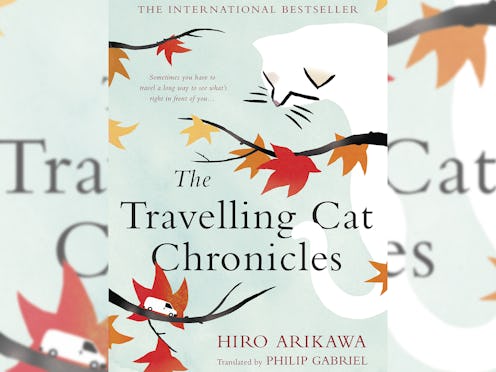Books
This Japanese Road Trip Novel Has A Twist — It's Narrated By A Cat

Move aside man’s best friend. There’s a new four-legged BFF in town and he’s decidedly feline. At least, that’s according to The Travelling Cat Chronicles — a title that’s bound to be in the running for the most heart-wrenching novel of 2018 and a book that all cat lovers should pick up immediately. (And actually, any and all cat haters should probably check it out too.)
Written by Hiro Arikawa and translated by Philip Gabriel — the English translator of Haruki Murakami and Kenzaburō Ōe — The Travelling Cat Chronicles tells the story of Nana and his owner, Satoru, and the cross-country road trip they take in Satoru’s old, silver van. In search of the perfect new caregiver for Nana, the duo crisscross Japan over the span of a year as Satoru visits (and informally interviews) four of his lifelong friends in hopes of securing Nana’s new home. At least, that’s what he’s led Nana and his friends to believe. He’s also set out to show Nana the world — or, in particular, Satoru’s world: where he grew up, the villages and cities he lived in along the way, a cemetery, Mount Fuji, the sea, and anything along the roadside — from tall grasses to a family of deer — that catches the duo’s eyes. Sort of an On The Road for cat-lovers — but with notably more heart.
The Travelling Cat Chronicles is narrated almost entirely by Nana, and is filled with the kinds of nuanced thoughts you’ve always suspected of cats (assuming you’re the kind of person who wonders what cats are thinking to begin with.) Nana is as cunning, sarcastic, proud, and superior as any cat-lover might suspect — and then some. He prefers cardboard boxes to cat beds, well-mannered dogs, and the best part of the tuna sashimi. He hates his name, large bodies of water, and being stroked by strangers. He can let himself out of his cat carrier, but does so with discretion.
The Travelling Cat Chronicles by Hiro Arikawa, translated by Philip Gabriel, $20, Amazon or Indiebound
“Despite appearances, I’m a pretty intelligent, well-mannered cat,” Nana tells readers upon becoming acclimated to his new home inside Satoru’s apartment. “Tell me not to sharpen my claws on certain places, and I refrain. The walls and door frames were forbidden so I used the furniture and rug for claw-sharpening. I mean, he [Satoru] never specifically mentioned that the furniture and rug were off limits. (Admittedly, he did look a little put out at first, but I’m the kind of cat who can pick up on things, sniff out what’s absolutely forbidden, and what isn’t. The furniture and the rug weren’t absolutely off limits, is what I’m saying.)”
And, later: “I’d removed every single tissue from the box and was sitting quietly in the corner contemplating the results of my actions.” What cat-lover in the world hasn’t been there before?
For as feisty as Nana is, Satoru is gentle — the kind of character who takes the time to show his new pet cat a printed photo album of his old pet cat, whose cell phone quickly fills with image after image of his beloved feline friend. He consults Nana as one would a life mate, the two often seeming to read one another’s minds. He’s the kind of character who, when his pet cat needs a new home, will take him on a cross-country journey in order to find it.
But as simple as both the premise and prose of The Travelling Cat Chronicles, it’s a novel that will leave your heart both comfortably full and utterly raw. It’s filled with courage and gratitude, love and loss, loyalty and devotion, and the twin joy and heartbreak of realizing home is where your person is. If there’s one takeaway from this book, it’s that fate is a fickle force indeed — a force that drives the narrative, coming up over and over again.
“Fate intervened to change everything,” writes Arikawa, at the start of his novel. “And fate hurt like hell.” Fate, in this particular instance, comes in the form of a speeding car; the figure upon which fate has taken a merciless turn is our title character, the (yet unnamed) traveling cat. Within just a few pages fates turn. No worse for wear — save a crooked tail — the stray feline will have not only acquired his name, Nana, (“seven” in Japanese, inspired by the shape of the tail) but his home, his person, and an affinity for chicken-topped crunchy cat food. Then fate intervenes again — taking Nana and Satoru on a road trip that will, if not change their lives, certainly inform the rest of them. And again — returning the characters to their home, in high spirits but a little worse for wear. Over and over again, the lives of Satoru and Nana give way to fate. Often it’ll hurt like hell. But not always.